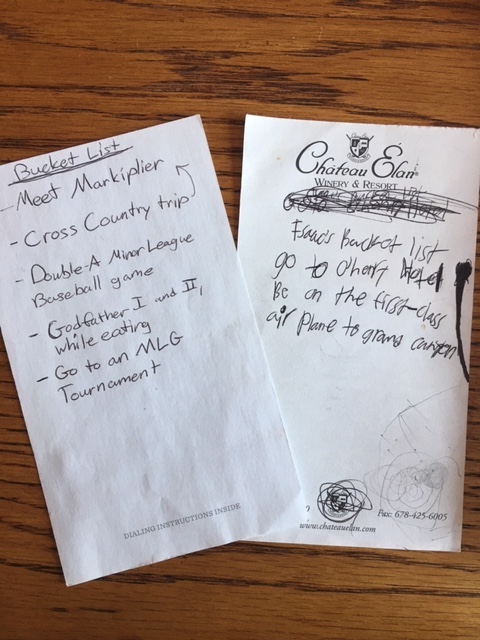This isn’t just another way of saying: Don’t lie. Avoiding lies is a baseline for being a good human being, but there’s a vast gray landscape stretching out between not lying and being true to one’s word. Even after we’ve stamped out lies, there’s tremendous work to do if we want to be men who are true to our word.
I’ll give you an embarrassing example from the annals of my many failures as a father. In a burst of enthusiasm years ago I had my older sons, who were much younger at the time, write out “bucket lists.” Not things they wanted to do before they die, but things they wanted to do with me before they turned 18.

Mostly the things on their lists entailed going places with me, like to a fancy hotel, or on a flight. One of them put on his list that he wanted us to skydive together. I don’t know where that particular boy’s list got to, but you can see to the right the lists I still have. And do you know how many of the things on their lists I did with these kids over the years since they wrote down their ideas?
One. One damned thing.
I have a lawyer’s valise full of excuses. Life gets busier as kids get older. The ideas they had then aren’t the same things they want to do now. We were just kind of daydreaming that day, not signing a binding contract.
The truth is, I don’t even remember what commitments I made regarding their lists. Maybe I made promises, or maybe I was clever, and couched it all as things we’d try to do. But the bottom line is that those little pieces of paper with the dreams of my children were tucked into a drawer, alongside whatever promises I might have made or implied, and forgotten.
Our children have this strange habit, when they are young, of believing everything we say. When we tell them: Sure, we’ll do that one day, we put a placeholder in their hearts. As they grow older, they learn that most adults don’t actually intend to honor every commitment. Unfortunately and all too often, they learn this first about their own parents. That we’re careful with our words so that we can sound enthusiastic about something in order to get them to leave us alone about it, but without actually committing to anything. Many of us adults make our words cheap, and in the process we cheapen ourselves.
It does something to relationships, this habit of making vague commitments and not following through on them. Our children, our spouse, our boss, our colleagues—they learn that while we may have fine intentions and fundamentally decent hearts, we’re just not men whose words carry the weight of stronger, more intentional men.
I don’t want to be a weaker man any more. Do you?
The habit of being true to our word is simple, but hard. The first step is governing the words that come out of our mouths. To stop making commitments we’re not confident we’ll honor. That doesn’t mean keeping quiet about things we don’t really want to do. It also includes silencing ourselves regarding the things we’re not confident we have the capacity to accomplish. The quickest way to strengthen the value of our word is to stop uttering cheap words.
The next step is to get a lot more intentional about hewing to the words that we do let out of our mouths. If you promise to read your children a book before bed, you by-God read them a book, no matter if you feel a headache coming on, or remember an important email you need to answer before morning. If you tell your wife that one day you’ll take her to that fancy antique store she’s always wanted to visit, you sit down with your calendar and book a specific day and time to keep your word.
And here’s what’s nice about how words and people work: The more we behave as if our own words mean something, the more people around us begin to have confidence in what we say. Isn’t that how all of us want to be known? As men of our word?
Like every other intentional fathering habit, this takes time. But any one of us can do it. We do it one word at a time. One true word after another.
Additional Resources
Getting Things Done. I’ve found David Allen’s system for getting control over every professional and personal commitment to be transformative in my own life, and I can’t recommend it highly enough.
White Lies and Black Truths. This short excerpt from an interview with renowned speaker and psychologist Jordan Peterson touches on the power of what we say and what we avoid saying.

